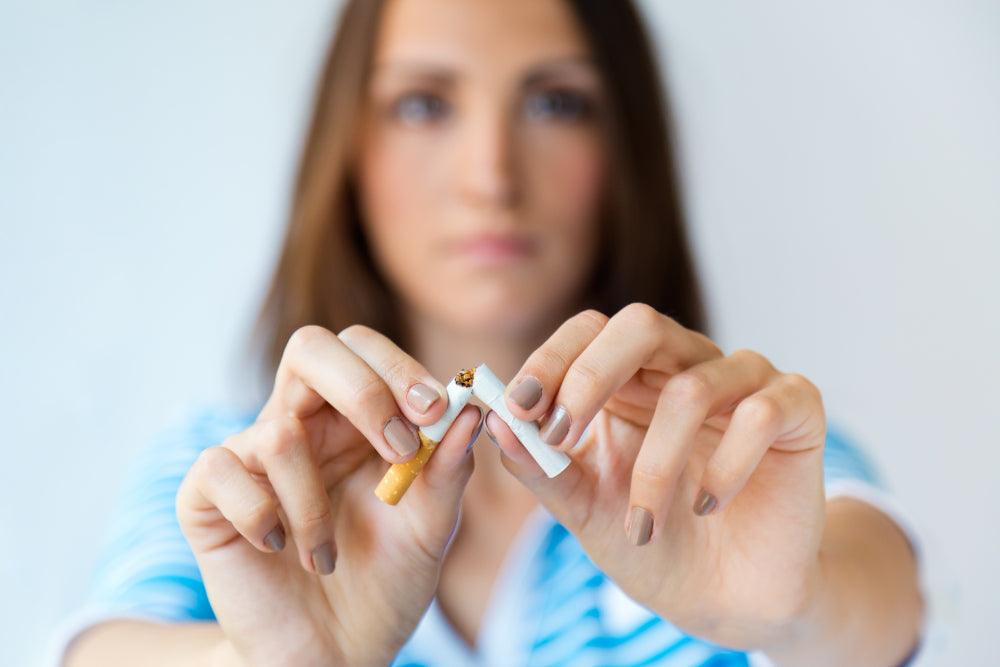Smoking and Testosterone: Is there a link?


The dangers of smoking are well-documented, with a significant connection between tobacco consumption and several health conditions. In the UK, it's estimated that around 78,000 people die from smoking-related illnesses each year, as per the National Health Service says NHS. Smoking is the root cause of most cases of lung cancer, chronic obstructive pulmonary disease (COPD), and heart disease, amongst others. Additionally, nicotine, the primary addictive substance in cigarettes, has profound effects on the human body's endocrine system, which, amongst other functions, regulates hormones.
Testosterone is a paramount hormone, especially in males. It's produced primarily in the testicles and plays a vital role in the development of male reproductive tissues such as testes and prostate. Testosterone is also crucial in promoting secondary sexual characteristics like increased muscle and bone mass, as well as the growth of body hair. But beyond its reproductive and developmental functions, testosterone impacts other physiological processes, ensuring men's health remains in optimal balance.
Testosterone plays a dynamic role in muscle building. It enhances the transcription of specific genes, increasing protein synthesis, leading to muscle growth. Many athletes and bodybuilders are well-aware of this, and some have resorted to taking synthetic testosterone to boost their muscle development. Besides muscle growth, testosterone is essential for the proper distribution of fat in males. Men with lower testosterone levels tend to have an increase in body fat, particularly around the abdominal area. Moreover, testosterone is vital for spermatogenesis, which is the process of sperm production in the testicles. A decline in testosterone levels can result in reduced sperm count and fertility issues.
Beyond the physical attributes and reproductive functions, testosterone influences men's psychological well-being. For example, optimal testosterone levels are associated with higher energy levels, improved mood, cognitive acuity, and even a positive outlook on life. Conversely, men with lower levels of testosterone often report feelings of fatigue, mood swings, depression, and reduced motivation. This mood-testosterone connection can be witnessed in men undergoing testosterone replacement therapy, where many report an elevation in their overall sense of well-being and mental clarity.

Buy Testosterone Blood test online here.
Smoking introduces a plethora of harmful chemicals into the body. Amongst the 7,000 chemicals found in tobacco smoke, at least 250 are known to be harmful, and about 70 can cause cancer, according to Cancer Research UK. When a person inhales cigarette smoke, these chemicals enter the bloodstream through the lungs and are then transported to every part of the body. Nicotine, carbon monoxide, tar, formaldehyde, and arsenic are just a few of these hazardous components.
Upon immediate inhalation of smoke, individuals may experience shortness of breath, coughing, and an increased heart rate. Long-term, the implications are far graver. Continual exposure to these chemicals can mutate cells, leading to cancerous growths. Additionally, smoking can constrict blood vessels, exacerbate respiratory conditions, and accelerate the ageing process. Notably, the harmful substances in tobacco can affect the endocrine system, thereby influencing hormone production and regulation.
Several studies have delved into the correlation between smoking and testosterone levels. A pivotal research study, published in the Journal of Clinical Endocrinology and Metabolism, found that male smokers had notably lower levels of circulating testosterone than their non-smoking counterparts. The reason behind this phenomenon is still a subject of research, but some scientists suggest that the toxic chemicals in tobacco might directly damage Leydig cells in the testes, which produce testosterone.
Numerous studies have consistently demonstrated a reduced testosterone level in smokers. For instance, a comprehensive study in 2013, which analysed data from over 5,000 men, found that smokers had around 15% lower testosterone levels compared to non-smokers. Additionally, the more cigarettes the study participants smoked daily, the more pronounced the drop in testosterone. Such findings make it clear that smoking can substantially affect testosterone levels, with potential repercussions on the health and well-being of male smokers, says Dr. Paul Stewart, a leading endocrinologist.
Quitting smoking has numerous health benefits, and the potential restoration of testosterone levels is one of them. Several studies have indicated that men who quit smoking show an improvement in their testosterone levels over time. A study published in the European Journal of Endocrinology revealed that within three months of cessation, former smokers saw a noticeable uptick in their testosterone levels. However, complete recovery might take longer, varying from individual to individual, and is also dependent on the duration and intensity of one's smoking history.
Various factors can influence the rate at which testosterone levels recover after quitting smoking. Age is a significant factor; younger individuals tend to recover faster than older ones. Additionally, the duration of the smoking habit plays a role – those who've smoked for decades might experience a slower hormonal recovery than those who smoked for just a few years. Genetics, overall health, diet, exercise, and stress levels also play a part in the recovery process. It's worth noting that seeking professional guidance on appropriate dietary and lifestyle changes can further aid in restoring hormonal balance, suggests Dr. Caroline Thompson, an endocrinologist in the UK.
While direct smokers are at a higher risk, passive smokers aren't entirely safe either. Secondhand smoke contains most of the harmful chemicals that direct smoke does. Research published in the Journal of Clinical Endocrine Investigations found that passive smokers, or those regularly exposed to secondhand smoke, also exhibited a decrease in testosterone levels, albeit to a lesser degree than active smokers.
The impact of secondhand smoke on testosterone levels largely depends on the extent and frequency of exposure. Men who live with heavy smokers or are exposed regularly in confined spaces are at a higher risk than those with occasional exposure. Additionally, the duration of passive exposure over the years can compound the effects, suggesting that long-term exposure to secondhand smoke might lead to more significant hormonal disruptions over time.
Reduced testosterone due to smoking can lead to several health implications. Physically, men might notice reduced muscle mass, increased body fat, and diminished bone density. There's also a risk of reduced fertility. From a mental health perspective, lower testosterone levels can lead to mood swings, increased levels of anxiety, depression, and reduced cognitive capabilities. Overall, these factors can lead to a decline in the quality of life, impacting relationships, work performance, and general well-being.
A drop in testosterone levels can exacerbate or lead to other medical conditions. For instance, osteoporosis, which is a condition marked by weakened bones, is often linked with low testosterone levels. Additionally, there's a known correlation between low testosterone and cardiovascular issues, diabetes, and even Alzheimer's disease, states Dr. Andrew Clarke, a leading cardiologist in the UK.
While testosterone is predominantly considered a male hormone, it plays a crucial role in women's bodies as well. In females, testosterone is responsible for bone strength, muscle mass, and even affects mood and libido. It's produced in the ovaries and adrenal glands.
Smoking affects women's testosterone levels similarly to men, but the implications can differ due to the unique hormonal balance in the female body. Studies have shown that female smokers tend to have higher levels of testosterone than non-smokers. This increase can lead to conditions like polycystic ovary syndrome (PCOS), which is marked by elevated testosterone levels in women. PCOS can result in irregular menstrual cycles, infertility, and other metabolic issues. Furthermore, the elevated testosterone caused by smoking in women can also lead to symptoms like acne, increased body hair, and even male-pattern baldness. The intricate balance of female hormones means that any disruption can have cascading effects on overall health.
Vaping, or the use of electronic cigarettes, has become a popular alternative to traditional smoking. Unlike traditional cigarettes, e-cigarettes heat a liquid (usually containing nicotine, flavourings, and other chemicals) to produce vapour. On the surface, vaping might seem less harmful since it doesn't produce tobacco smoke with its myriad of harmful compounds. But when it comes to testosterone levels, is vaping any different?
There's limited research comparing the impact of vaping and traditional smoking directly on testosterone levels. However, early studies indicate that while vaping might have a lesser overall health impact compared to traditional smoking, it's not without its risks. Since many e-liquids contain nicotine, which is known to affect testosterone levels, there remains a concern. One study, published in the journal Tobacco Control, suggests that the hormonal effects of vaping may be slightly less pronounced than traditional smoking but still significant.
Diet plays a significant role in testosterone production. For example, a diet rich in zinc, vitamin D, and omega-3 fatty acids can support optimal testosterone levels. Conversely, chronic alcohol consumption and a diet high in processed foods can depress these levels. Exercise, especially resistance training, has been shown to boost testosterone. Chronic stress, which raises cortisol levels, can act antagonistically to testosterone. Lack of sleep is another variable that can depress testosterone levels.
To maintain healthy testosterone levels, experts like Dr. Philip Evans from the UK recommend a balanced diet, regular exercise, managing stress through relaxation techniques, and ensuring adequate sleep. Reducing alcohol consumption and avoiding endocrine disruptors, often found in plastics, can further safeguard testosterone levels.
Quitting smoking can lead to withdrawal symptoms, which can stress the body and potentially affect testosterone. To mitigate this, adopting a gradual reduction strategy instead of abrupt cessation might help. Pair this with a balanced diet, exercise, and adequate sleep to support the body during this transition.
The NHS in the UK offers smoking cessation programmes that provide not just medical but also psychological support. There are also numerous support groups, both offline and online, where individuals can share experiences and strategies.
Research suggests a dose-response relationship between the number of cigarettes smoked and the decline in testosterone levels. The more an individual smokes, the greater the potential drop in testosterone. A study in the Journal of Andrology found that heavy smokers (those smoking 20 or more cigarettes a day) experienced a more pronounced decrease in testosterone compared to light smokers.
Nicotine Replacement Therapies, such as patches, gums, and inhalers, provide nicotine without the other harmful substances in cigarettes. While these therapies can aid in smoking cessation, the presence of nicotine means they might still influence testosterone levels, albeit potentially to a lesser degree than direct smoking.
Herbal cigarettes are often touted as a "natural" alternative to traditional cigarettes. However, while they don't contain nicotine, they do produce tar and carbon monoxide when burned, which can have health implications. Current research is limited on their direct impact on testosterone levels, but the absence of nicotine might mean they have a lesser effect in this regard.










Plus get the inside scoop on our latest content and updates in our monthly newsletter.